The Amazing Witness of Fulfilling Bible Prophecy
|
This is a non-WLC article. When using resources from outside authors, we only publish the content that is 100% in harmony with the Bible and WLC current biblical beliefs. So such articles can be treated as if coming directly from WLC. We have been greatly blessed by the ministry of many servants of Yahuwah. But we do not advise our members to explore other works by these authors. Such works, we have excluded from publications because they contain errors. Sadly, we have yet to find a ministry that is error-free. If you are shocked by some non-WLC published content [articles/episodes], keep in mind Proverbs 4:18. Our understanding of His truth is evolving, as more light is shed on our pathway. We cherish truth more than life, and seek it wherever it may be found. |
"There is a God in heaven that revealeth secrets and maketh known what shall be in the latter days" (Daniel 2:28).
The Bible: A Reliable Witness
Our objective in this article is a three-fold one. It is to show:
- That Yahuwah guides the destiny of nations;
- That He has a purpose with the earth that is rapidly coming to fruition;
- The Bible is what it claims to be: the Inspired Word of Yahuwah.
The closer we look at anything that man has created, the greater the number of flaws revealed. Submit a polished piece of steel to inspection under a microscope, and it appears pitted and rough; stands too close to an oil painting and looks ugly and distorted.
That is not so with Yahuwah's creation, however. Examine the petal of a rose as closely as you will, and its soft beauty will be more wonderfully revealed. Submit the wing of a butterfly, or the excellent mechanism of the eye, to scrutiny under the microscope, and hidden and complex marvels will be instantly seen.
The same is true of the Bible. The more minutely its pages are studied, the more extraordinary beauty and significance there is revealed. It is transforming in its effect. It provides a basis for happier living while revealing the way to life eternal in the future. As Paul wrote: "It has the promise of the life that now is, and that which is to come" (I Timothy 4:8). And, like the diverse forms of creation about us, the more it is studied, the greater will its wonder be revealed, testifying that the Hand that made it is divine.
The fantastic fulfillment of Bible prophecy demonstrates this beyond all doubt. Man cannot predict the future with any certainty, but the Bible reveals the end from the beginning. Yahuwah has declared:
"I am Yahuwah, declaring the end from the beginning and from ancient times the things that are not yet done, saying, My counsel shall stand, and I will do all My pleasure" (Isaiah 46:10).
This is no false claim. The fulfillment of Bible prophecy down the ages guarantees that Yahuwah can do what He wills and that He will do what He proclaims. It is an assurance that complete reliance can be placed upon the Bible and that Yahuwah will make good His promise to:
- Send Yahushua Christ to reign on earth (Acts 1:1 1; Acts 3:20-21; Luke 1:32-33).
- Raise from the dead those responsible to judgment (Psa. 49:15-20; 2 Tim. 4:1-7; 1 Cor. 15).
- Reward with eternal life those found worthy (Matthew 19:29; Romans 2:7).
- Grant them authority with Christ in His earthly kingdom (Revelation 5:9-10; 2:26; Daniel 7:27).
- Establish universal peace and goodwill on earth (Psalm 72; Isaiah 2:24).
Our object is to present some of the wonders of prophecy so that the reader may accept with assurance the teaching of the Bible. This is shown by the rise and fall of nations considered in the light of Bible prophecy. The Bible predicted that certain nations would disappear while others would remain until the setting up of the Kingdom of Yahuwah on earth. Among the former were Nineveh, Babylon, Tyre, Edom, Ammon, Philistia, etc.; the latter were Arabia, Persia, Libya, Ethiopia, Egypt, and Israel.
The former nations have entirely disappeared as predicted; the latter remains, and in the condition that the prophets declared they would be found.
What other book describes with such certainty events to come?
We propose briefly considering some of these predictions that the wonder of their fulfillment might be better appreciated.
Tyre: A Place For Fishing Nets
The 26th chapter of Ezekiel records a remarkable prophecy against Tyre. This ancient power had opposed Yahuwah's people of Israel, and against it, the prophet, in the name of Yahuwah, had thundered Divine judgment. The Tyrians were told:
- That Nebuchadnezzar, King of Babylon, would conquer Tyre (vv. 7-1)
- That the city would be made desolate (v. 2).
- That it would be thrown into the sea (v. 12).
- It would become a place to spread nets upon (v. 14).
- That its maritime supremacy would cease forever (v. 17).
Every detail of this prophecy had complete and incredible fulfillment.
Few people today know anything about Tyre, so wholly was the prophecy fulfilled. But in B.C. 596, when it was uttered, Tyre was the foremost sea power of the ancient world. Strategically situated on the coast of the Mediterranean, in what is now known as Lebanon, Tyrian ships dominated the seas for centuries.
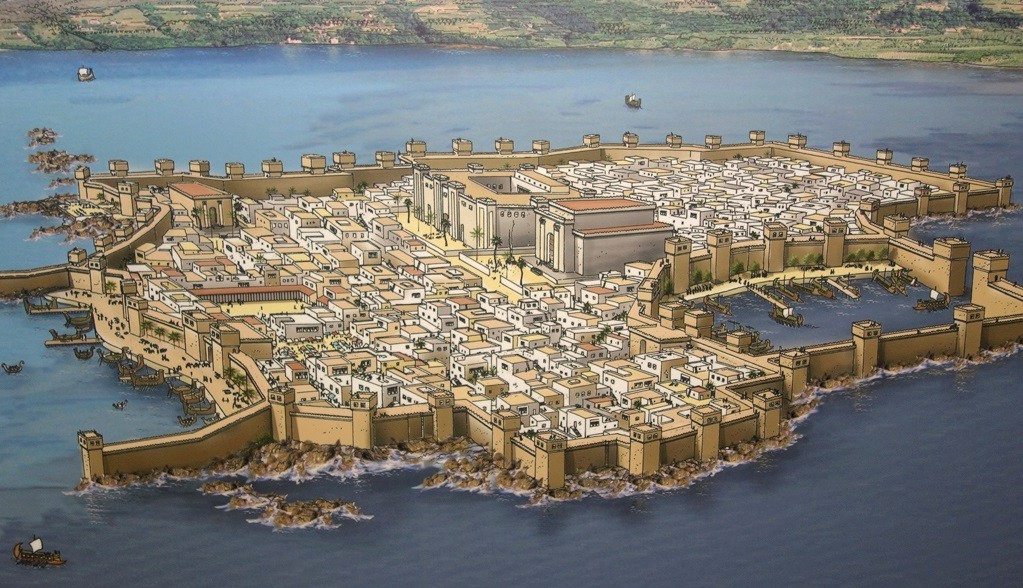
Early in the sixth century B.C., however, Tyre incurred Nebuchadnezzar's wrath and Babylonia's rising power. Nebuchadnezzar determined that he would destroy the power of Tyre, and accordingly, he marched against the city and besieged it. After a protracted siege for some years, he breached the walls, and the city fell. When the Tyrians saw that resistance was futile, they transferred the bulk of their treasure to an island in their possession, half a mile from the shore. The old city was deserted, and Tyre continued to defy her enemies from her new water-enclosed fortress.
Though the original city had been "made desolate" by Nebuchadnezzar, as predicted by Ezekiel, the balance of the prophecy had not been fulfilled. Ezekiel (Ch. 26) declared:
"They shall make a spoil of thy riches, and make a prey of thy merchandise; they shall break down thy walls, and destroy thy pleasant houses; and they shall lay thy stones, thy timber, and thy dust amid the water ... I (Yahuwah) will make thee like the top of a rock; thou shalt be a place to spread nets upon; thou shalt be built no more ... I shall bring up the deep upon thee, and great waters shall cover thee" (vv. 12, 14,19).
Nebuchadnezzar did not accomplish this, though he destroyed the original city. The prophecy described an unnamed power as "they shall do it." History reveals that this was Alexander the Great and his Grecian warriors.
Meanwhile, for almost 250 years, the partly-ruined city of ancient Tyre remained on the mainland, while Tyrian power rose once more from the island fortress. Contrary to the requirements of the prophecy, the stones, timber, and dust of the ancient city had not been "thrown into the sea" as predicted, its site had not been made "bare like the top of a rock," nor had Tyrian power been irreparably broken. On the contrary, the world's riches flowed through its gates to the east, and Tyrian influence rose again to its previous eminence.
It must have seemed as though Ezekiel's prophecy had failed. But Yahuwah is never in a hurry, and delay is challenging faith. At last, Tyre made a fatal mistake. It opposed Alexander of Greece. In their island fortress, protected by their powerful navy and surrounded by the blue waters of the Mediterranean, the Tyrians could afford to defy their land forces. But Alexander was determined that he would bring Tyre under his control. To do so, he had to get to the island fortress, which meant he had to build a ramp connecting the mainland with the island across which his soldiers could march.
The stones, the walls, and the pleasant houses of the ruins of the mainland city (the one Ezekiel said would be utterly destroyed and never rebuilt) provided him with a means to do this. He ordered that they be thrown "into the sea" (as Ezekiel had predicted) for this purpose. A clean sweep was made of the site, and no remnant of the city remained. Nor was it ever rebuilt. Yahuwah had decreed that this would be its fate, and His words were fulfilled to the very letter, though for 250 years, every indication seemed to point to the contrary.
Today, the blue waters of the Mediterranean wash over the ruins of Tyre, which has become "a place to spread nets upon." Go to the site of ancient Tyre today, and it is possible to see Arab fishermen doing what Ezekiel predicted they would do 2,500 years ago. Thomson, in his "Land and the Book," writes:
"The number of granite columns that lie in the sea is surprising. The eastern wall of the inner harbor is entirely founded upon them, and they are thickly spread over the bottom of the sea on every side. Tyre must have been a city of columns and temples par excellence . . . Should anyone ask incredulously, 'Where are the stones of ancient Tyre?' . . . they are found spread over the causeway of Alexander, in her choked up the harbor, and at the bottom of the sea."
Alexander's attack was successful, and Tyrian sea power was destroyed. No longer did her fleets dominate the seas, and no longer were her praises sung in the marts of the ancient world. As a nation, she disappeared, never to rise again.
The causeway built by Alexander still connects Tyre's one-time island fortress with the mainland. Still, it so wholly has every vestige of the original city disappeared that its' position can only be ascertained by the distance measured from the ruins of the fortress. The mighty city of ancient Tyre was erased entirely.

Tyre now in ruins underwater1
But the fantastic thing is the detail in which the Bible predicted all this and how each point was finally fulfilled. A fallible man cannot predict the future with such certainty and detail, but the Bible does. It shows that this beautiful book can be thoroughly relied upon and confirms that those prophecies which speak of the second advent of Christ and the setting up of the Kingdom of Yahuwah on earth will come to pass, even though the fulfillment might appear improbable to mortal man.
Egypt - A Base Nation
Egypt was one of the most powerful nations of antiquity. It was renowned alike for science, arts, and civilization. For long epochs of time, it exercised world power; for centuries, it held at bay the mighty empires of Nineveh and Babylon.
To those familiar with Egypt’s greatness, it must have appeared most unlikely that the prophecies of Yahuwah concerning this power would be realized.
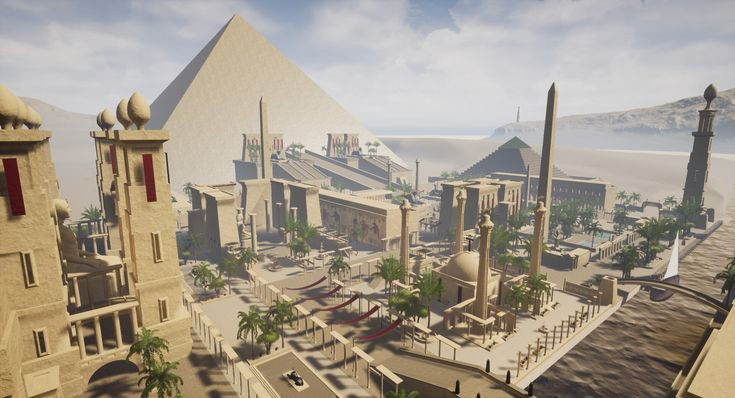
In his 29th chapter, Ezekiel declared that the King of Babylon would suppress Egypt for 40 years and take away many of its people captive. These events were fulfilled within a few years of their proclamation by the prophet. Still, Ezekiel also spoke of Egypt's condition today, and in a manner so dogmatic and yet so accurate as to confound all critics of the Bible.
The truth of his words cannot be disproved.
Nebuchadnezzar had intended to destroy Egypt as a nation. Still, though the prophet predicted the destruction of other nations extant at that time, he declared that Egypt would continue as a nation until the setting up of the Kingdom of Yahuwah on earth, despite the intentions of the King of Babylon. Thus Egypt remains today, though other nations have disappeared throughout history.
The prophet also predicted the very condition in which the nation would be found. He declared that it would remain "a base kingdom" (Ezek. 29:14); it would "no longer rule over the nations" (v. 15), and, what is more striking, "There shall be no more a prince of the land of Egypt" (Ezek. 30:13).
These words were spoken when Egypt was a mighty power, feared by other nations, and disputing with Babylon as the sole dominion of the world. Many other nations sheltered under the shadow of Egyptian protection, among them the people of Israel.
Ezekiel's words thus foretold a total reversal of Egyptian power. At the same time as the prophet declared that Tyre would come to a total end, he also proclaimed that Egypt would partially recover from the attack of Nebuchadnezzar  and would continue as a nation, though in a degraded or "base" condition, ruled over by foreigners, and no longer dominating others.
and would continue as a nation, though in a degraded or "base" condition, ruled over by foreigners, and no longer dominating others.
Apart from Divine inspiration, none could speak with such certainty, or in such detail, concerning the future of an eminent and, initially, powerful nation. History reveals how completely the prophecy was fulfilled. Following the downfall of Babylon, Egypt was successfully dominated by the Greeks, Romans, Saracens, and Mamelukes. Early in the sixteenth century, the Turks took possession of the country. Towards the end of the 18th century, the French arrived. They were driven out by the British, who handed control back to the Turks. In 1882, the national party, under Arabi Pasha, revolted and forced the Turkish rulers to flee. The English, however, subdued the rebellion and occupied Egypt. Ultimately the British withdrew, but foreigners continued to dominate.
The defeats have demonstrated Egypt's political weakness she has suffered at the hands of the Israelis. In this, as in other features of modern Egypt, the fantastic testimony of Bible prophecy is manifested. The Bible predicts this. It declares that "a perverse spirit" shall be manifested in Egypt to "cause it to err" with the result that "the land of Judah shall be a terror unto Egypt" (Isa. 19:14-17).
These words have been fulfilled to the very letter in our times.
Historians have expressed astonishment at how Egypt has been subjected by various races and ruled by "strangers" down the ages. The student of the Bible is not astonished. In this further evidence of the hand of Yahuwah in world affairs, he sees a wonderful fulfillment of the most remarkable book extant: the Bible.
Babylon: To Become a Ruin
The nation that brought about the initial downfall of Egypt, Tyre, and other contemporary powers, including Jewry, was Babylon. Babylon was the greatest city-empire of the ancient world. Nebuchadnezzar, its most illustrious king, was a most prolific builder. Under his direction, the capital was almost entirely rebuilt, ultimately symbolizing his power and prestige. Its massive walls were thought to be impregnable. Its hanging gardens were one of the seven wonders of the ancient world. Its towers, buildings, architecture, and temples were the pride of all Chaldea. Contemporary historians state that the mighty city, which formed a square 15 miles each way, was enclosed with walls 87 feet thick and 350 feet high.
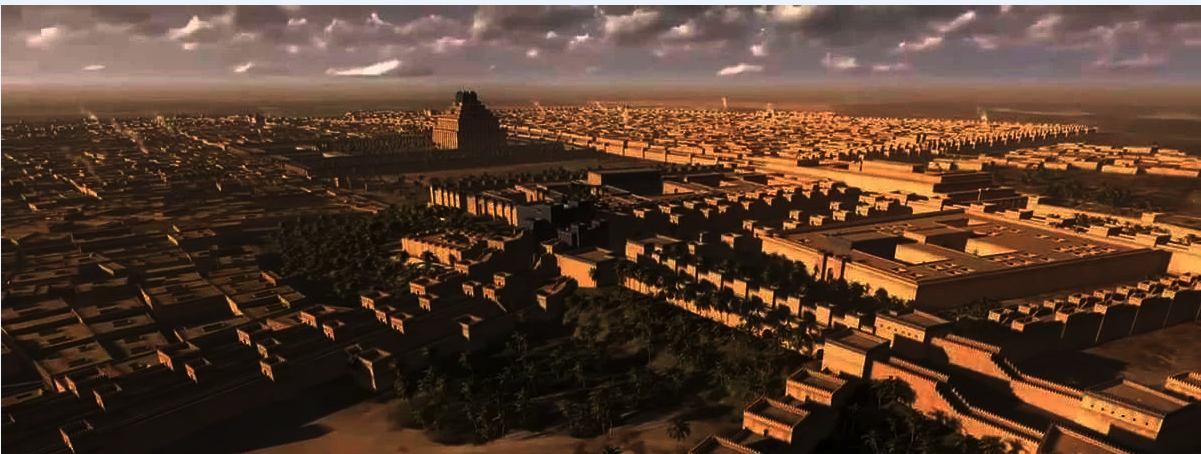
Nebuchadnezzar aimed to make the city a permanent memorial of his greatness.
But all this material strength, pomp, and glory were nothing to the God of Israel. Over a century before the birth of Nebuchadnezzar, Isaiah prophesied:
"And Babylon, the glory of kingdoms, the beauty of the Chaldee's excellency, shall be as when Yahuwah overthrew Sodom and Gomorrah. it shall never be dwelt in from generation to generation ... neither shall the Arabian pitch tent there; neither shall the shepherds make their fold there. But wild beasts of the desert shall lie there . . ." (Isaiah 13:19-22).
The boldness of such a prediction is startling when the size and strength of Babylon are considered. It was uttered when the city was rising to power. Yet so thoroughly was it fulfilled that until recently, the site of Babylon was in dispute among scholars. Some critics of the Bible even claimed that Nebuchadnezzar was fiction and that he never existed outside the pages of the Scriptures!
During the 19th century, however, the ruined palaces of this beautiful city of the past were unearthed. To the confusion of Bible critics, the name "Nebuchadnezzar" was prominently displayed in its records. But all the glory of the past had long disappeared. Babylon was no longer the metropolis of a mighty empire, for the sands of the desert had entirely covered its ruins to blot it out of existence. Its original fertility had been destroyed so that "shepherds do not make their folds there" (Isa. 13:20). Nor will Arabs pitch their tents there, for some local superstition prohibits them from camping overnight at the site.
Ancient Babylon has become the resting place of the hyena, the wolf, and the jackal, as the prophet predicted! The prophecies of the Bible, recorded in the books of Isaiah, Jeremiah, Ezekiel, and Daniel, have had incredible and minute fulfillment.
Today, the massive ruins of Babylon are a silent witness to the veracity of Bible prophecy and the glory of the ancient city. They constitute an archaeological wonder, the delight of tourists, but those ruins are deserted and avoided by the Arab dwellers of the land who will not stop near them overnight.
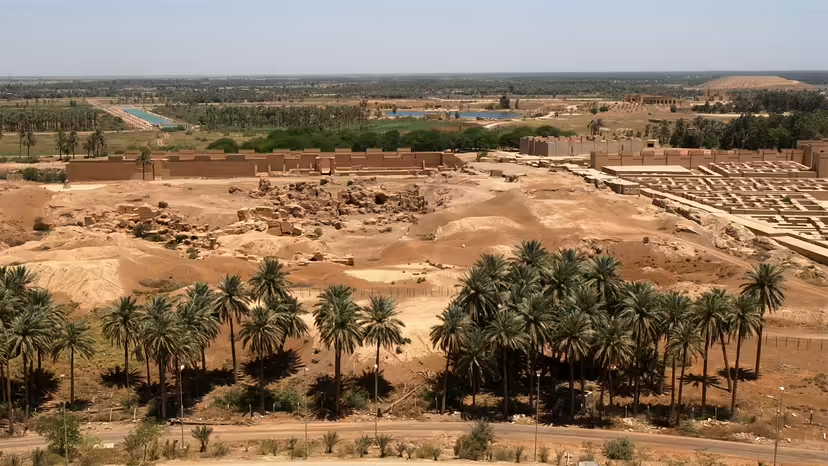
This was once the nerve center of the greatest empire of all time, and Nebuchadnezzar, its chief ruler, rebuilt the city for perpetuity. He boasted in his pomp and glory: "Is not this great Babylon, that I have built for the house of my kingdom by the might of my power and for the honor of my majesty?" (Daniel 4:30). How transient is the glory of man!
His words echo down the corridor of time, testifying not to his greatness but to the infallible truth and reality of Bible prophecy. The answer of Yahuwah to Nebuchadnezzar's boast was: "Babylon, the glory of kingdoms, the pride of Chaldea, shall be as when Yahuwah overthrew Sodom and Gomorrah....... As Babylon hath caused the slain of Israel to fall, so at Babylon shall fall the slain of all the earth" (Jeremiah 51:49,58).
It is Yahuwah Who guides the destiny of nations.
In the year 606 B.C., Babylon took Israel captive. Today the Jews are returning, and Israel is beginning to flourish, but Babylon's palaces shall "never be inhabited." This mighty empire was reduced to nothing, exactly as described by Yahuwah.
Israel - To Be Restored
Israel was numerically among the weakest of nations in ancient times, and yet, though the prophets predicted the absolute destruction of mightier powers, Yahuwah declared concerning the Jew:
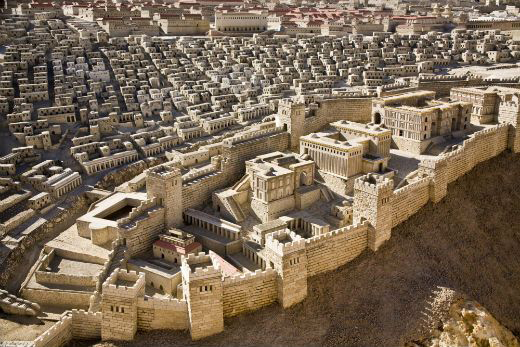 "For I am with thee to save thee. Though I make a full end of all nations, whither I have scattered thee, yet will I not make a full end of thee; but I will correct thee in measure, and not leave thee, altogether unpunished" (Jeremiah 30:11).
"For I am with thee to save thee. Though I make a full end of all nations, whither I have scattered thee, yet will I not make a full end of thee; but I will correct thee in measure, and not leave thee, altogether unpunished" (Jeremiah 30:11).
Yahuwah's purpose is to be manifest through the Jewish people (John 4:22), and they are destined to assume a critical position among the mortal subjects of Christ's kingdom. One of the titles adopted by Lord Yahushua was "King of the Jews." On this basis, they procured his death, but he is to return to humble, discipline, and educate that disobedient nation in the truths of Yahuwah (Romans 11:26) and claim his rightful position as King (Matt. 19:28; Luke 1:32-33). From Jerusalem, he will extend his power throughout the earth, bringing all mankind subject to his authority (Isaiah 60:12). Jerusalem will become the metropolis of his power (Isa. 24:23); it will be reconstituted the "throne of the Lord" (Jer. 3:17), and "the city of the great King" (Matt. 5:35).
Thus despite the past rebellion of the people against the ways of Yahuwah, the words of Scripture will yet be fulfilled: "As ye were a curse among the nations, O house of Israel! so will I save you, and ye shall be a blessing" (Zechariah 8:13).
The return of the Jews to the land of Israel in our time is a step towards that consummation.
In the fantastic history of Israel, the wonders of the prophetic word are outstanding. Every major incident in their history has been the subject of prophecy. In three remarkable chapters (Deuteronomy 28, 29, 30), the whole history of Israel, from the time they entered the Land of Promise until the return of Christ, is depicted. It includes the captivities to which they were subjected, their scattering among the Gentiles, and even the very feelings of hatred that they would engender in other people.
This prophecy was delivered by Moses and given to the people before they constituted a nation in the Land of Promise.
Most national leaders' custom is to encourage their followers with glowing pictures of future greatness. Still, when Moses led Israel out of Egypt 3,500 years ago, he had no false illusions as to the destiny of the people. By inspiration of Yahuwah, he told them plainly that they would prove disobedient to Yahuwah's commands, and as a result: "The Lord shall scatter thee among all people, from one end of the earth even unto the other" (Deuteronomy 28:64).
He even described the state they would find themselves in among the countries of their dispersion:
"Among these nations shalt thou find no ease, neither shall the soul of thy foot have rest; but the Lord shall give thee there a trembling heart, and failing of eyes, and sorrow of mind, and thy life shall hang in doubt before thee, and thou shalt fear day and night, and shalt have none assurance of thy life" (Deuteronomy 28:65-66).
Does not this exactly answer the condition of the Jews in persecution? The Eichmann trial showed how Jews were brutally tortured and put to death in the concentration camps of Germany and how that 6,000,000 were destroyed during the Hitler regime. And that is an incident in a long history of persecution in which most nations have oppressed the Jews, a treatment that would have destroyed any other nation but the Jews.
The Bible predicts that they would be persecuted and explains why - because they would turn their backs on Yahuwah and reject the only secure defense available to save them.
Moses also revealed how they would be scattered into all nations. 1,500 years before it came to pass, he prophesied the siege of Jerusalem that in A.D. 70 brought to an end the Jewish State in one of the most terrible incidents of bloodshed and violence recorded in history. He declared:
"The Lord shall bring a nation against thee from far, from the end of the earth, as swift as the eagle flieth; a nation whose tongue thou shalt not understand ... and he shall besiege thee in all thy gates until thy high and fenced walls come down wherein thou trustedst (Deuteronomy 28:49-52).
Rome appeared prominently on the stage of human history at least 1,200 years after Moses proclaimed these words, but is identified in the passage above. The standard of the Roman legions was a flying eagle; they came from "the end of the earth" (the utmost confines of the then-known world), and they spoke a language unknown to the Jews (there is no language more foreign to the structure and idiom of Hebrew than Latin).
This nation, clearly identified in the prophecy, marched against the Jews in A.D. 70, besieged and ultimately destroyed the city, and took the people captive. Instructions were issued by the Roman Commander, Titus, that the incredible Temple was to be preserved. Still, in the heat and fury of battle, the legions ignored his command, and the city and temple were overthrown. This fulfilled a similar prophecy predicted by Yahushua concerning the overthrow of the city and temple (Luke 21:24). He declared concerning the latter: "There shall not be left one stone upon another that shall not be thrown down" (Luke 21:6).
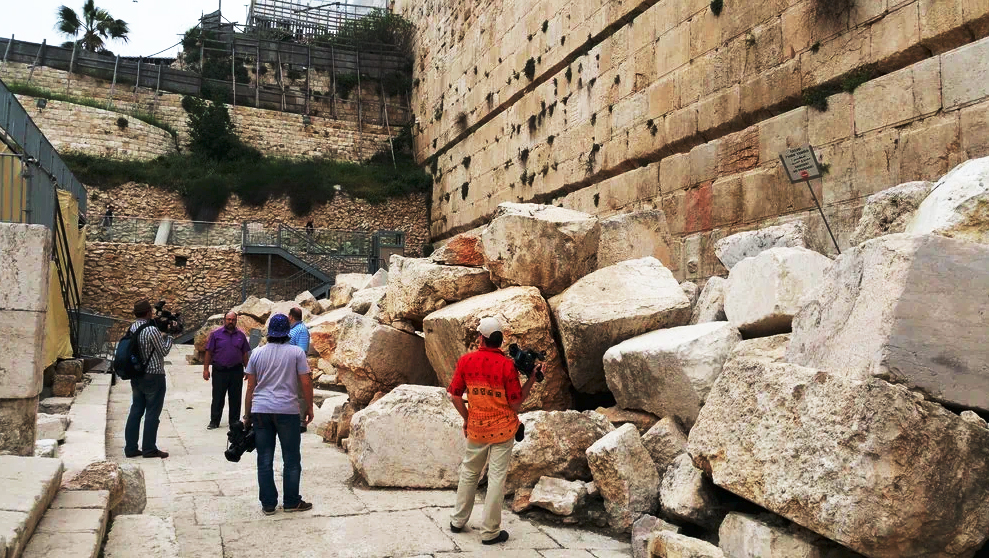
But the Bible foretold not only the scattering of Israel but also their regathering, "He that scattered Israel will regather him," declared Jeremiah (Ch. 31:10). And Moses also predicted:
"The Lord will turn thy captivity, and have compassion upon thee, and will return and gather thee from all the nations whither he hath scattered thee" (Deuteronomy 30:3).
Other Bible prophecies declare:
"I will gather them out of all countries, whither I have driven them in Mine anger, and in My fury, and in great wrath; and I will bring them again unto this place, and I will cause them to dwell safely ... yea ... I will plant them in this land assuredly with My whole heart and with My whole soul" (Jeremiah 32:37-41).
"I will bring them out from the people, and gather them from the countries, and will bring them to their own land, and feed them upon the mountains of Israel"- (Ezekiel 34:13). "it shall be in the latter days" (Ezekiel 38:8,12,16).
The present return of the Jews to their ancient land is a token fulfillment of these prophecies. The complete fulfillment awaits the return of the Lord Yahushua Christ.
It is of tremendous significance that in our time, some three million Jews have returned to the land, and after two thousand years of dispersion, Israel is again a nation on earth. Students of prophecy realize that this is the prelude to the return of Christ, who is destined to reign from Jerusalem over a regenerated Israel, cleansed from their previous unbelief and hardness of heart (Joel 3:16-17; Ezek. 36:22-29).
Christ's kingdom will extend beyond Israel, however, to incorporate all nations (Jer. 3:17; Zech. 14:17) so that "many people and strong nations shall come to seek the Lord in Jerusalem" (Zech. 8:22). "Peace and goodwill among men" will then replace hatred and war, for he shall cause "righteousness and praise to spring up before all nations" (Isa. 61:11).
Amazing Deliverance Of Jerusalem
One of the most amazing vindications of the prophetic word is the occupation of Jerusalem in 1967. In that year, after the remarkable victory of Israel in the Six-Day War, in which it defeated within a week the armies of Egypt, Syria, and Jordan by which it was invaded, the Jewish people found themselves in control of the city of Jerusalem after two thousands years of dispersion.
The circumstances are remarkable, almost miraculous. When the UN decreed in 1947 that there would be a Jewish State, it also declared that Jerusalem should be an international city belonging to neither Jews nor Arabs.
Israel would not have it today if the city remained like that!
Instead, Jordan annexed Jerusalem and occupied it until 1967. Then, in the dying moments of the Six-Day War, when Egypt had been defeated, Jordan suddenly decided to invade Israel. The Israelis pleaded with Jordan not to do so, but the latter persisted. They declared war on Israel and were decisively defeated in a few hours. Through that victory, the ancient city of Jerusalem and all of what is called today the West Bank came under the control of Israel.
In this, Christ's prophetic words were remarkably fulfilled, for when he predicted the fall of Jerusalem, and the scattering of its people throughout the world, he also declared that the Jewish people would REGAIN THAT CITY IN THE LATTER DAYS. Here are his words:
"They (the Jews) shall fall by the edge of the sword, and shall be led away captive into all nations, and Jerusalem shall be trodden down of the Gentiles UNTIL the times of the Gentiles be fulfilled" (Luke 21:24).
The word "until" marks the termination of the time during which that city would be under Gentile domination.
Christ was citing the prophecy of Daniel 8:13-14, which also gives a time limit to the "treading down" of the holy city: 2300 prophetic days (or years). And it is a fantastic fact that Jerusalem fell to the Jewish people exactly 2300 years from the time of the initial prophecy of Daniel 8: the attack of Alexander the Great against Persia in 333 B.C. (cp. vv. 21-22). From B.C. 333 to 1967 is exactly 2300 years.
But the wonder of this prophecy does not end there. Following his words that require the release of Jerusalem, the Lord Yahushua Christ spoke of economic and political distress among all nations, of "distress of nations with perplexity" (Luke 21:25), of "men's hearts failing them for fear" through prevailing conditions (v. 26), and then of the manifestation of himself on the earth again in glory: "They shall see the Son of Man coming ... with power and great glory" (v. 27).
This very sequence has been amazingly fulfilled. Following the defeat of Arab powers and the occupation by Jews of Jerusalem and the West Bank, nations' economic and political conditions have sharply deteriorated. The nations are faced with perplexing problems they cannot solve; preparations for war with weapons of such destruction might create fear in the hearts of people thinking. How have these conditions developed? Through the effect of the Six-Day War and the Israeli occupation of Jerusalem. Having failed in war, the Arabs had recourse to economic pressures, including oil. Their objective was to cause other powers to pressure Israel and destroy the nation economically. Their policy has resulted in the inflationary spiral and associated problems that have affected all nations.
Hence, this "time of trouble" has followed the course outlined by the Lord in his Olivet prophecy relating to the last days—further evidence of the divine inspiration of the Bible (Hebrews 1:1).
World History Condensed Into 15 Verses
The 2nd Daniel records a remarkable vision seen by the King of Babylon in which the history of the world is condensed into a few prophetic verses.
In a dream, he saw an image of a mighty warrior composed of different metals and shining with tremendous luminous glory. It had a head of gold, breast and arms of silver, belly and thighs of brass, legs of iron, and feet and toes of part iron and part clay. As he watched the mighty image, he saw a stone hurling toward it. It struck it on the feet, causing it to topple over and crash to the ground. The metals broke into pieces. The stone grew, crushing the metals to powder, which the wind blew away. The image was gone, but the stone remained. The king saw it grow into a mountain and fill the whole earth.
What did it all mean?
The clergy of Babylon could not offer an interpretation.
But Daniel, the Hebrew prophet, did. He pointed out that the four metals of the image represented four world powers that would arise. The fourth, however, would become divided, answering to the toes of the image. Some of these divided nations would be strong, others would be weak, answering to the iron and the clay.
World history has followed the pattern of prophecy outlined by Daniel to the king. There have been four world powers: Babylon, Medo-Persia, Greece, and Rome. Rome was divided into several parts, answering modern Europe. Today we live in the "clay and iron stage," a stage concerning which Daniel declared the nations would be unable to unite on a standard policy, a time when the "clay" of Communism has mixed with the "iron" of imperialism to form the political pattern of the present.
Read Daniel's words, and look at the world today and see how exactly the former describes the latter. He declared that the nations would be "partly strong and partly weak" . . . "unable to cleave together" (vv. 42-43).
But there remains a phase of the vision yet to be fulfilled. The king saw the image standing with all its might, and then, suddenly, it was shattered by a "little stone" that broke it to pieces and grew into a mountain filling the whole earth and grinding the metals to powder. The king was told that the dream revealed "what shall be in the latter days" (Daniel 2:28,45). Thus the image must yet be caused to exist in all its terrible power (v. 31) before being smitten by the stone. In other words, the modern powers ruling upon the territories of those ancient kingdoms represented by the metals must be confederated together to form one great alliance.
Over one hundred years ago, in 1848, a Christadelphian commentator of Bible prophecy (John Thomas in Elpis Israel wrote as follows:
"in order, then, to prepare for the catastrophe, the image which is now in antagonistic parts, must be confederated; in other words, a dominion must arise before the setting up of the kingdom of Yahuwah which shall rule over the toe-kingdoms (of Europe), and the Turkish and Persian territories, till it meets the British Power in the east ... I shall be able to show, from other parts of the prophetic Word, that the power destined to play the conspicuous part indicated above is RUSSIA. It will dominate all the ten kingdoms (European powers), subdue Turkey, and incorporate Persia into its empire. Still, when it has reached its zenith, it will, in turn, be precipitated into the abyss, and its dominion suppressed for a thousand years . . . They will contend for the dominion of the East, but neither will obtain it . . ."
Why will neither obtain it? The answer is given in the prophecy of Daniel. It is because the "little stone" power will intervene to overthrow the image and fill the earth with its glory. Daniel, in explanation of this, told the king:
"in the days of these kings shall the Yahuwah of heaven set up a kingdom which shall never be destroyed, and the kingdom shall not be left to other people, but it shall break in pieces and consume all these kingdoms and stand forever" (Daniel 2:44).
That is the destiny mapped out for the nations by Yahuwah. Today, Russia is attempting to confederate the nations into one mighty bloc in accordance with the prophecy of Daniel. Her intention is world domination of such a nature as to be opposed to Yahuwah's purpose, and this was predicted thousands of years ago in Bible prophecy. But there is a limit beyond which Russia cannot proceed. At the height of her success, when it will seem that the world is about to succumb to her influence, a new Power will be seen in the political arena. This will be the "stone" power of the vision, the kingdom that Yahuwah will set up on earth with Christ as king. Associated with the Lord in power will be those who have lived in accordance with his precepts now, for they shall be raised from the dead to receive their inheritance, including eternal life.
The vision of Daniel 2 depicted this stone as growing into a world-filling mountain to the exclusion of all else. The Kingdom of Yahuwah will do that. It is small in its beginnings but destined to rule the whole earth. It is least in the considerations of men now but ultimately will dominate all mankind. A mountain filling the whole earth is its symbol, which Daniel interpreted as meaning: "A kingdom which shall never be destroyed, and will not be left to others."
Can we place any reliance on the establishment of such a Kingdom? Surely, with the wonders of the prophetic word in mind, we must answer in the affirmative. Just as surely as Tyre became a "place for the spreading of nets," as Egypt fell from her eminence and became a base nation, Babylon was utterly destroyed, and Israel was scattered and is now regathered, so also will this final prophecy be fulfilled! Christ is coming and will reign on earth.

Who can doubt it with the facts before them?
Remember that world events reveal that the epoch of Christ's return is at hand. The times are significant, the issues are vital, and you owe it to yourself and your family to seek Yahuwah's way.
This is a non-WLC article. Source: http://www.christadelphia.org/archive/witness.php
1 By RomanDeckert - Own work, CC BY-SA 4.0, https://commons.wikimedia.org/w/index.php?curid=84362192
We have taken out from the original article all pagan names and titles of the Father and Son, and have replaced them with the original given names. Furthermore, we have restored in the Scriptures quoted the names of the Father and Son, as they were originally written by the inspired authors of the Bible. -WLC Team








